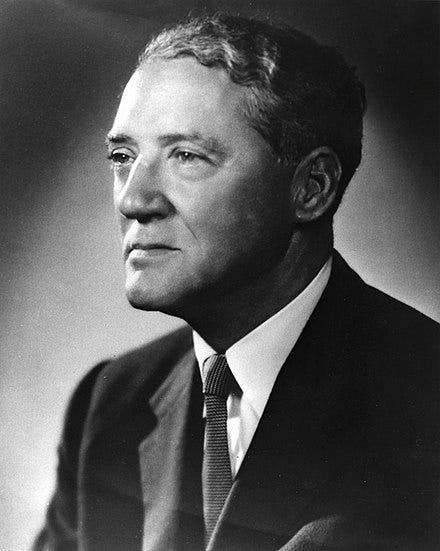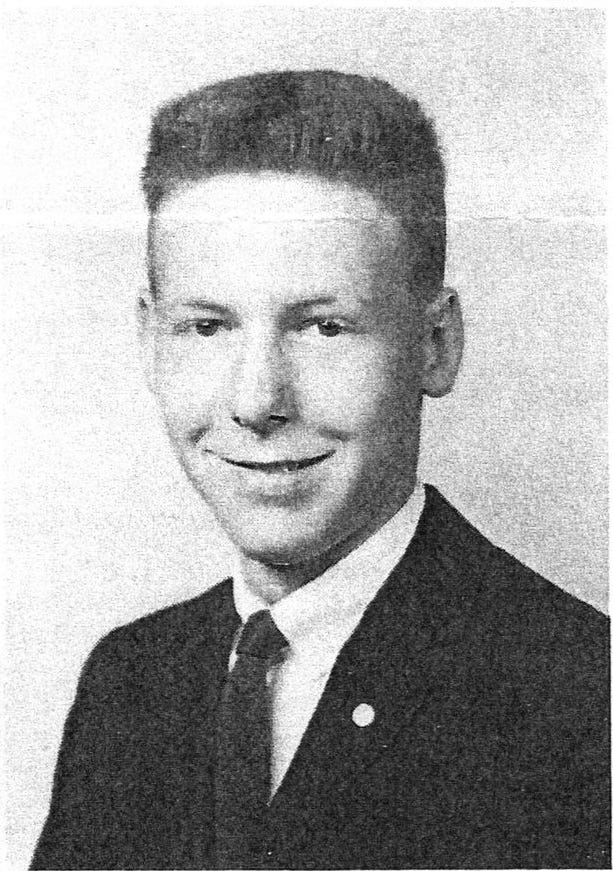Young Addison
Banned Histories of Race in America
Ok, first of all, I wanted to thank you all for your incredibly kind words about my piece on This American Life. It was a real thrill and I’m very proud of it, so your words really mean a lot. Thank you.
Some of you missed the airing and were asking how you can hear it. You can find it right here. The episode itself opens with Ira Glass talking about Paul Harvey’s old radio show The Rest of the Story. If you’re unfamiliar, the show was largely the compelling-yet-unknown backgrounds of popular historical figures. Harvey would keep you guessing right until the end, when he’d reveal who he was talking about, punctuating the whole thing with, “And now you know… The Rest of the Story.”
That idea is close enough to what I do here that I thought I’d just go for it entirely. So, here we go…
John Sherman Cooper was a Kentucky Republican, but you wouldn’t know it from his voting record. He served in the US Senate from 1956-1973 and he voted for the Civil Rights Acts of 1957 and 1960 and 1964 and 1968. He was pro-union and anti-Vietnam War. Cooper was one of only thirteen Republican Senators to vote in favor of Medicare.
He was once confronted by one of his fellow Republicans, "Are you a Republican or a Democrat? When are you going to start voting with us?" to which Cooper replied, "If you'll pardon me, I was sent here to represent my constituents, and I intend to vote as I think best."
Cooper was the type of politician that doesn’t exist now and barely existed then and he was, of course, an incredible influence on his young intern, Addison.
Now, a couple of things about young Addison. First off, he was from Alabama and descendant of enslavers. Both of his great-great-grandfathers had a total of 14 enslaved Black people laboring for them. Secondly, young Addison had those wild incel, dead-eyed Timothy McVeigh vibes…
Of course, you shouldn’t judge a book by its cover, no matter how ghoulish. Young Addison was in line with the right side of history. He attended the March on Washington. He was in the actual audience hearing the “I Have a Dream” speech live.
When the internship was over, young Addison and Cooper stayed close. The two men went together to witness President Lyndon B. Johnson sign the Voting Rights Act of 1965, which Cooper had also voted for. Two years later, when Addison was about to graduate law school, he was also about to be eligible for the draft. He managed to get a spot in the Army Reserve two days after taking the bar exam. Cooper wrote a letter to a general and Addison was honorably discharged after just 37 days of service.
Addison stayed in Cooper’s home state and got into local politics. A year after Cooper’s death in 1977, Addison became the Judge/Executive of Jefferson County. He was known to support labor rights and civil rights and healthcare. He was basically the kind of politician you’d hope a Cooper intern would be. Eventually he even ran for Cooper’s old Senate seat. And he won.
But something had changed. And if it wasn’t for that 37 days of service and the domestic-terrorist look in his eyes, you’d never guess that something wasn’t quite right about Addison. Soon, he would become the very opposite of Cooper.
No longer a champion of a better America, he would become arguably the most destructive political force the country has seen in generations. Maybe Cooper had been his only moral compass, because Addison began to actively work against civil rights and voting rights and healthcare. Maybe it was a sudden embrace of his family history that caused him to rally his entire party against any effort of the country’s first Black president. Maybe it’s generational trauma that eventually made him such a blight on American politics that he’s publicly hated by members of his own party. Even now, as he suffers poor health in the public eye, polls show Addison Mitchell McConnell III, or as you probably know him, Mitch McConnell to be the most disliked politician in the entire country. And now you know…
The Rest of the Story.



